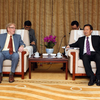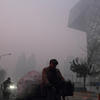Bo Zhang, Yaowen Zhang, Xueli Zhao, and Jing Meng. 2018. “Non-CO2 greenhouse gas emissions in China 2012: Inventory and supply chain analysis.” Earth's Future, 6, 1. Publisher's VersionAbstract
Reliable inventory information is critical in informing emission mitigation efforts. Using the latest officially released emission data, which is production based, we take a consumption perspective to estimate the non-CO2 greenhouse gas (GHG) emissions for China in 2012. The non-CO2 GHG emissions, which cover CH4, N2O, HFCs, PFCs, and SF6, amounted to 2003.0 Mt. CO2-eq (including 1871.9 Mt. CO2-eq from economic activities), much larger than the total CO2 emissions in some developed countries. Urban consumption (30.1%), capital formation (28.2%), and exports (20.6%) derived approximately four fifths of the total embodied emissions in final demand. Furthermore, the results from structural path analysis help identify critical embodied emission paths and key economic sectors in supply chains for mitigating non-CO2 GHG emissions in Chinese economic systems. The top 20 paths were responsible for half of the national total embodied emissions. Several industrial sectors such as Construction, Production and Supply of Electricity and Steam, Manufacture of Food and Tobacco and Manufacture of Chemicals, and Chemical Products played as the important transmission channels. Examining both production- and consumption-based non-CO2 GHG emissions will enrich our understanding of the influences of industrial positions, final consumption demands, and trades on national non-CO2 GHG emissions by considering the comprehensive abatement potentials in the supply chains.






